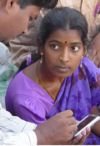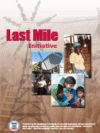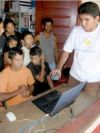Announcements |
|
 ARNIC Speaker: On Nov 8, '07, Nick Economides, Executive Director, NET (Network, E-Commerce, and Telecommunications) Institute presented his work on Network Neutrality
[slides and video from seminar] ARNIC Speaker: On Nov 8, '07, Nick Economides, Executive Director, NET (Network, E-Commerce, and Telecommunications) Institute presented his work on Network Neutrality
[slides and video from seminar]
 New Book, Edited by Hernan Galperin and Judith Mariscal,Digital Poverty:
Latin American and Caribbean Perspectives,
Practical Action Publishing/IDRC 2007 New Book, Edited by Hernan Galperin and Judith Mariscal,Digital Poverty:
Latin American and Caribbean Perspectives,
Practical Action Publishing/IDRC 2007
 Recent Book, by Manuel Castells, Mireia Fernandez - Ardevol, Jack Linchuan Qiu and Araba Sey: Mobile Communication and Society: A Global Perspertive, (MIT Press, 2006) [more info from MIT Press] Now available in Spanish Recent Book, by Manuel Castells, Mireia Fernandez - Ardevol, Jack Linchuan Qiu and Araba Sey: Mobile Communication and Society: A Global Perspertive, (MIT Press, 2006) [more info from MIT Press] Now available in Spanish
 Recent Book, edited by Manuel Castells and Gustavo Cardoso: The Network Society: From Knowledge to Policy (Washington DC: Johns Hopkins Center for Transatlantic Relations, 2006); also available in Portuguese as A sociedade em Rede: Do Conhecimento à Acção Política, Imprensa Nacional, Casa da Moeda, Lisboa , 2006. Includes chapters by Jonathan Taplin, Jeffrey Cole, Hernán Galperin and François Bar. (free download in both languages) Recent Book, edited by Manuel Castells and Gustavo Cardoso: The Network Society: From Knowledge to Policy (Washington DC: Johns Hopkins Center for Transatlantic Relations, 2006); also available in Portuguese as A sociedade em Rede: Do Conhecimento à Acção Política, Imprensa Nacional, Casa da Moeda, Lisboa , 2006. Includes chapters by Jonathan Taplin, Jeffrey Cole, Hernán Galperin and François Bar. (free download in both languages)
Recent Book, edited by Hernán Galperin and Judith Mariscal: Digital Poverty: Latin American and Caribbean Perspectives
[download PDF]
Research Notes:
Tsunami Field Notes – Phi Phi Island, Thailand
Seungyoon Lee, 23rd July – 28th July, 2005
Mobile Phones for Disaster Preparedness
Arul Chib & Seungyoon Lee, September 2005
Reviews
William Davies, of the Institute for Policy Research, reviews Hernán Galperin's New Television, Old Politics in New Media & Society 7(2) |
|
|
Projects
at the Annenberg Research Network on International Communication
Ongoing Projects:
Completed projects:
The Socio-Economic Impact of Mobile Communication in Latin America
Manuel Castells, Hernán Galperin and François Bar, with Mireia Fernandez-Ardevol (UOC)
2007-2009
|
 The deployment of mobile telephony throughout Latin America has accelerated during the past few years. The Universitat Oberta de Catalunya (UOC) is launching a major research project to analyze the socio-economic impacts this will have on the region. Starting in Fall 2007, ARNIC Professors Castells, Bar, and Galperin will be leading this effort, in collaboration with Prof. Fernandez-Ardevol at UOC, with funding from Fundación Telefónica of Spain. The deployment of mobile telephony throughout Latin America has accelerated during the past few years. The Universitat Oberta de Catalunya (UOC) is launching a major research project to analyze the socio-economic impacts this will have on the region. Starting in Fall 2007, ARNIC Professors Castells, Bar, and Galperin will be leading this effort, in collaboration with Prof. Fernandez-Ardevol at UOC, with funding from Fundación Telefónica of Spain.
For more information, see the Press Release from Fundación Telefónica. |
The Inflection Point: Global Governance in the Internet Age
Jonathan Aronson, Peter Cowhey (UCSD), and John Richards (UCSD)
|
The global, digital ICT infrastructure is critical to economic growth and technological innovation. Its efficiency, reliability and flexibility are critical to enhancing global welfare. At this point in the development of communications networks, infrastructure, and applications and going forward current commercial and government structures will be inadequate to deal with future developments, This project explores how best to fulfill the promise of global, converged ICT markets in the United States and internationally. A draft manuscript was discussed in May 2007 at a review conference in La Jolla. A revised manuscript will be submitted to MIT Press for consideration this fall.
- Cowhey, Peter, Jonathan Aronson, and John Richards, “Property Rights and 3G Wireless Standards,” in John Zysman and Abe Neuman, eds. How Revolutionary Was the Revolution? (Stanford: Stanford University Press, 2006)
|
Regional Dialogue on the Information Society
Hernan Galperin (DIRSI steering committee, Manuel Castells (Board of Advisors) |
 DIRSI (Diálogo Regional sobre Sociedad de la Información) is a network of professionals and academic institutions that seeks to create knowledge to support policymaking that promotes effective participation of poor and marginalized communities of Latin America and the Caribbean in the Information Society. DIRSI (Diálogo Regional sobre Sociedad de la Información) is a network of professionals and academic institutions that seeks to create knowledge to support policymaking that promotes effective participation of poor and marginalized communities of Latin America and the Caribbean in the Information Society.
For more information, see the DIRSI web site |
The World Internet Project (WIP)
Jeffrey Cole
|
 This international, collaborative project examining the social, political, and economic impact of the Internet and other new technologies is a project of the Annenberg’s Center for the Digital Future (formerly the UCLA Center for Communication Policy). WIP is conceived as the study of the Internet that should have been conducted of early television. While television mostly is about entertainment, the Internet could change the way the world plays, works, and learns. Founded in 1999, the WIP now has partners in more than 20 countries on five continents. Based at universities and research institutes, the WIP conducts detailed research, generates numerous publications, and holds annual conferences that explore the impact of these new technologies. The WIP is committed to sharing the results of its work with leaders in the policy, government, and business communities as well as with journalists, parents, teachers and interested citizens. This international, collaborative project examining the social, political, and economic impact of the Internet and other new technologies is a project of the Annenberg’s Center for the Digital Future (formerly the UCLA Center for Communication Policy). WIP is conceived as the study of the Internet that should have been conducted of early television. While television mostly is about entertainment, the Internet could change the way the world plays, works, and learns. Founded in 1999, the WIP now has partners in more than 20 countries on five continents. Based at universities and research institutes, the WIP conducts detailed research, generates numerous publications, and holds annual conferences that explore the impact of these new technologies. The WIP is committed to sharing the results of its work with leaders in the policy, government, and business communities as well as with journalists, parents, teachers and interested citizens.
For more information, visit the project site at: http://www.worldinternetproject.net/ |
Technology Appropriation: The Abaporu Project
François Bar, Francis Pisani, Matthew Weber |
 The abaporu project explores technology appropriation: how people shape the technology they use to make it their own and how they transform their practices around technology’s possibilities. The abaporu project explores technology appropriation: how people shape the technology they use to make it their own and how they transform their practices around technology’s possibilities.
The ideas behind the abaporu project were first laid out in “Mobile technology appropriation in a distant mirror: baroque infiltration, creolization and cannibalism”, by François Bar, Francis Pisani and Matthew Weber (April 07) [PDF - draft]. The paper was presented on April 12th as part of the Annenberg Center’s DIY speaker series, and on April 20th in Buenos Aires at the Seminario sobre Desarrollo Económico, Desarrollo Social y Comunicaciones Móviles en América Latina hosted by Fundación Telefónica [PPT slides]. |
Village Computing:
Hernán Galperin and François Bar |
 The Annenberg Research Network on International Communication partnered with the Grameen Technology Center and the Center for Internet Studies (U. of Washington) in launching Village Computing, a multi-sector, international association of experts in ICT4D working to catalyze Village Computing globally. The Consortium identified and discussed emergent trends in village computing, and generated actionable insights for practitioners, policymakers, as well as technology and service developers and providers. The Annenberg Research Network on International Communication partnered with the Grameen Technology Center and the Center for Internet Studies (U. of Washington) in launching Village Computing, a multi-sector, international association of experts in ICT4D working to catalyze Village Computing globally. The Consortium identified and discussed emergent trends in village computing, and generated actionable insights for practitioners, policymakers, as well as technology and service developers and providers.
We are now participating
in the launch of a 4 year research program based on that study, jointly supported by IDRC and the Bill and Melinda Gates Foundation to study the social and economic impact of public access to ICTs
For additional Information, see the report from the study's first phase:
- “Village Computing: A State of the Field. Reflections on the Village Computing Consultation”, Grameen Foundation, November 2006.
Available at http://www.villagecomputing.org/
|
Last-Mile Initiative in Peru
Hernán Galperin |
 USAID's Last Mile Initiative (LMI) is a global program to expand the access of the rural poor to communications. Launched in April 2004, LMI intends to spur increases in productivity and transform the development prospects of farmers, small business, new startups and other organizations in rural areas presently underserved by the world's major voice and data telecommunications networks. A team comprised by Prof. Galperin and 2005-2006 postdoctoral fellow Raul Roman in association with researchers at the Instituto de Estudios Peruanos (IEP has been selected to evaluate the development impact of the LMI implementation in Jauja Peru. During 2006, the team carried out baseline surveys and focus groups, as well as several interviews with local implementing partners. During 2007, the team will continue evaluating the progress of the LMI operator and conduct follow up field visits. USAID's Last Mile Initiative (LMI) is a global program to expand the access of the rural poor to communications. Launched in April 2004, LMI intends to spur increases in productivity and transform the development prospects of farmers, small business, new startups and other organizations in rural areas presently underserved by the world's major voice and data telecommunications networks. A team comprised by Prof. Galperin and 2005-2006 postdoctoral fellow Raul Roman in association with researchers at the Instituto de Estudios Peruanos (IEP has been selected to evaluate the development impact of the LMI implementation in Jauja Peru. During 2006, the team carried out baseline surveys and focus groups, as well as several interviews with local implementing partners. During 2007, the team will continue evaluating the progress of the LMI operator and conduct follow up field visits.
For more information, see:
|
Wireless technologies and community development: two cases from Suruaca and Maguari (Para, Brazil)
Hernan Galperin, Raul Roman, Francois Bar, Seungyoon Lee and Arul Chib. |
 This project, funded by IDRC, seeks to evaluate the development impact of low-cost wireless access systems in underserved areas (mostly rural) in Latin America. The evaluation is based on household surveys carried out before and after the project's implementation. During the last year the research team focused on developing the survey instruments and establishing partnerships with local researchers in each of the countries where evaluations will be carried out. In June 2006, baseline surveys were administered in two remote communities in the Amazon basin in Brazil, prior to the implementation of a Wi-Fi based system that will bring connectivity to these villages. During the next months we expect to complete the first phase of implementation in our sites in Paraguay and Mexico. This project, funded by IDRC, seeks to evaluate the development impact of low-cost wireless access systems in underserved areas (mostly rural) in Latin America. The evaluation is based on household surveys carried out before and after the project's implementation. During the last year the research team focused on developing the survey instruments and establishing partnerships with local researchers in each of the countries where evaluations will be carried out. In June 2006, baseline surveys were administered in two remote communities in the Amazon basin in Brazil, prior to the implementation of a Wi-Fi based system that will bring connectivity to these villages. During the next months we expect to complete the first phase of implementation in our sites in Paraguay and Mexico.
For additional information, see:
- "Novas comunidades têm acesso à internet", Jornal Intercomunitário do Projeto Saúde e Alegria - Rede Mocoronga de Comunicação Popular
- Lee, S. (2007, May). Social networks and ICT for development: Preliminary findings from Brazilian rural communities. Paper presented at the annual conference of the International Communication Association (ICA), San Francisco, CA.
- Lee, S., & Chib, A. (2007, in press). "Wireless for the poor: No strings Attached? A framework for wireless initiatives connecting rural areas." In N. Carpentier & B. De Cleen (Eds.), Participation and media production. Critical reflections on content creation. ICA 2007 Conference Theme Book. Newcastle, UK: Cambridge Scholars Publishing.
- Lee, S. (2005). Telecommunications, spatial infrastructure, and spatial interaction: Looking through the case of Seoul. Global Media Journal, 4(7), Article No. 12.
|
Poverty & Information and Communication Technology in Urban and Rural Eastern-Africa (PICTURE)
Francois Bar, Nyaki Adeya (with assistance from Araba Sey) |
We have been collaborating with IDRC to help form a research network in East Africa. Collaborating with poverty experts from India and Africa, Prof. Bar organized and led a training seminar in Nairobi for researchers from Kenya, Rwanda, Tanzania and Uganda, aimed at generating a research proposal that IDRC could fund. He continues to be involved in the project as an advisor, as the project started in earnest in 2007.
See:
- Poverty & Information and Communication Technology in Urban and Rural Eastern-Africa - Case Studies from Kenya, Rwanda, Tanzania and Uganda, Research Proposal to the International Development Research Centre (IDRC), Ottawa, Canada, December 2006
|
| |
| COMPLETED PROJECTS |
Unlicensed spectrum in Latin America and the Caribbean .
Hernan Galperin in collaboration with Bruce Girard (Comunica.org and Lirne.net) |
This project seeks to examine the regulatory environment for the deployment of low-cost WLAN solutions on a license-exempt basis in Latin America and the Caribbean . For this purpose, the research team developed a comprehensive mapping of the rules that govern the use of the 2.4GHz and 5GHz bands in the region. Preliminary results reveal that, although governments are increasingly providing for unlicensed use in these bands, many obstacles persist for license-exempt access to these bands in several countries. Final results will be presented by Prof. Galperin at the World Summit on the Information Society in Tunis in November 2005. They will also be made available at www.wilac.net.
See:
- Galperin, Hernan (2005). Wireless Networks and Rural Development:
Opportunities for Latin America. Information Technologies and
International Development 2(3): 47-56. [PDF - 163K]
|
The Potential of Mobile Phones to Act as an Effective Tsunami Early Warning System
Jonathan Aronson, Arul Chib, Seungyoon Lee, Kavya Yadav
2005-2006 |
This project examined the role of information and communication technologies (ICT), specifically rural telecenters and low-cost telephony, in Tsunami affected regions of coastal India . The project evaluated 1) the impact of the existing telecommunication infrastructure in acting as a warning signal, 2) the role of ICTs in assisting disaster relief, and 3) the potential of low-cost communication technologies as a disaster relief system. The research included interviews with relief agencies and NGO's in the Tamil Nadu region, evaluation of the role of low-cost telecenter infrastructure in these regions, and a network analysis of communities for understanding the social ties and support networks.
Research Notes:
- Seungyoon Lee, Tsunami Field Notes – Phi Phi Island, Thailand, July 2005
- Arul Chib & Seungyoon Lee, Mobile Phones for Disaster Preparedness, September 2005
- Chib, A., & Lee, S. (2005). Mobile phones for disaster preparedness. Annenberg Research Network on International Communication. A report prepared for the project, The Potential of Mobile Phones to Act as an Effective Tsunami Early Warning System. Annenberg Research Network on International Communication.
|
Wireless Cities: Municipal Wi-Fi Networks
Francois Bar , Hernan Galperin and Namkee Park
2004-2006 |
This project explores the current surge in the deployment of wireless networks by municipalities. It seeks to understand the dynamics behind this new mode of infrastructure development and to assess it’s social and economic consequences.
For Additional Information, see in particular:
- Bar, François and Namkee Park, "Municipal Wi-Fi: The Goals, Practices, and Policy Implications of the U.S. Case", Communications & Strategies, no. 61, 1st quarter 2006, p.107-125. [PDF]
- Bar, François and Hernan Galperin , “ Geeks, Cowboys and Bureaucrats: Deploying Broadband, the Wireless Way ” The Southern African Journal of Information and Communication (SAJIC), Issue 6, 2006. (also published in Portuguese as , “Geeks, Burocratas e Cowboys: criando uma infra-estrutura Internet, de modo Wireless” in Manuel Castells and Gustavo Cardoso, eds. A sociedade em Rede: Do Conhecimento à Acção Política, Imprensa Nacional – Casa da Moeda, Lisbon , 2006 (pp. 291-304.)[PDF] )
- Bar, François & Hernan Galperin, "Building the Wireless Internet Infrastructure: From Cordless Ethernet Archipelagos to Wireless Grids," Communication & Strategies, Volume 54 - 2nd quarter 2004, (pp. 45-54)
[PDF]
|
Free/Open Source Software and economic development in Brazil
François Bar,
Jae-Eun Chung and Jade Miller |
For the past three years, Brazil has pursued a consistent policy to promote the adoption and local development of free and open source software (FOSS). Beyond the cost savings on licensing, the goal of that policy is to promote an alternative economic development path for Brazil, based on digital inclusion and knowledge appropriation through active involvement by local software developers and users. This project explored some of the dimensions of that strategy.
See:
- Chung, Jae Eun, and Jade Miller, Open Source Software Policy and The MNC: The Case of Brazil , paper presented at the IAMCR 50 th Anniversary Conference, Paris, July 23-25, 2007
|
The Mobile Communication Society: A cross-cultural analysis of available evidence on the social uses of wireless communication technology
Manuel Castells (USC), Mireia Fernandez-Ardevol (UOC), Jack Linchuan Qiu (USC), and Araba Sey (USC) |
 This project examines existing research on the social uses of wireless communication technology. It seeks to provide a solid empirical basis for an informed discussion of the social uses and social effects of wireless in Europe, the Asian Pacific and the United States. Major themes explored include the deep connection between wireless communication and the emergence of youth culture, the transformation of language by texting and multimodalty, the growing importance of wireless communication in socio-political mobilization, and changes in the practice of time and space resulting from wireless communication. Started in preparation of our Oct 2004 High Level Workshop on “ Wireless Communication Policies and Prospects:A Global Perspective”, this work was published as a book by MIT press. This project examines existing research on the social uses of wireless communication technology. It seeks to provide a solid empirical basis for an informed discussion of the social uses and social effects of wireless in Europe, the Asian Pacific and the United States. Major themes explored include the deep connection between wireless communication and the emergence of youth culture, the transformation of language by texting and multimodalty, the growing importance of wireless communication in socio-political mobilization, and changes in the practice of time and space resulting from wireless communication. Started in preparation of our Oct 2004 High Level Workshop on “ Wireless Communication Policies and Prospects:A Global Perspective”, this work was published as a book by MIT press.
See:
|
| |
| |
| |
| |
| |
|
|